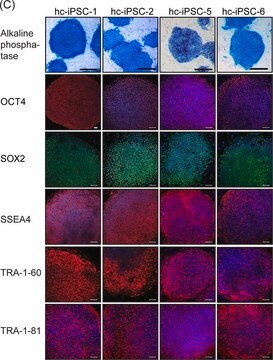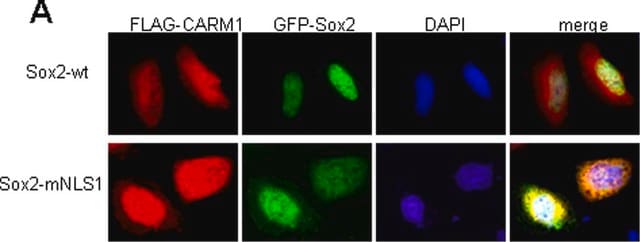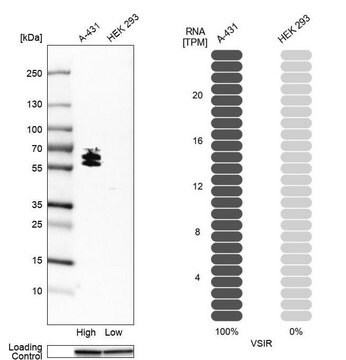추천 제품
생물학적 소스
mouse
Quality Level
결합
PE
항체 형태
purified antibody
항체 생산 유형
primary antibodies
클론
MC-813-70, monoclonal
종 반응성
human
제조업체/상표
Milli-Mark®
기술
flow cytometry: suitable
immunocytochemistry: suitable
동형
IgG3κ
배송 상태
wet ice
타겟 번역 후 변형
unmodified
유전자 정보
human ... FUT4(2526)
관련 카테고리
일반 설명
N-terminal GST-tagged, recombinant human MuRF1 full length, expressed in E.coli. Purified using glutathione sepharose.
The cell-surface markers used routinely to identify undifferentiated human embryonic stem cells (hESCs) were initially characterized as markers for mESCs, mouse embryonic carcinomas (ECs), or human EC cells. Stage-specific embryonic antigen-3 (SSEA-3) and SSEA-4 are widely used as cell-surface markers to define both human and mouse ESCs. SSEA-3 and SSEA-4 are expressed on undifferentiated hESCs but not on undifferentiated mESCs.
특이성
This antibody reacts with the stage-specific embryonic antigen-4 (SSEA-4) that is expressed upon the surface of human tetracarcinoma stem cells (EC), human embryonic germ cells (EG) and human embryonic stem cells (ES).
No immunoreactivity is evident with undifferentiated murine EC, ES and EG cells. Expression of SSEA-4 is down regulated following differentiation of human EC cells. In ctontrast, the differentiation of murine EC and ES cells may be accompanied by an increase in SSEA-4 expression.
No immunoreactivity is evident with undifferentiated murine EC, ES and EG cells. Expression of SSEA-4 is down regulated following differentiation of human EC cells. In ctontrast, the differentiation of murine EC and ES cells may be accompanied by an increase in SSEA-4 expression.
면역원
Human embryonal carcinoma cell line 2102Ep.
애플리케이션
Immunocytochemical staining of live H9 human ES cells incubated for 30 minutes at 37oC with 1:50 dilution of anti-SSEA-4, clone MC-813-70, PE conjugate (Cat. No. FCMAB116P) monoclonal antibody.
Pluripotent human ES cells exhibit strong immunoreactivity to this antibody.
Immunocytochemical staining of fixed H9 human ES cells incubated for 2 hours at 2-8oC with 1:50 dilution of anti-SSEA-4, clone MC-813-70, PE conjugated (Cat. No. FCMAB116P) monoclonal antibody.
Pluripotent human ES cells exhibit strong immunoreactivity to this antibody.
Pluripotent human ES cells exhibit strong immunoreactivity to this antibody.
Immunocytochemical staining of fixed H9 human ES cells incubated for 2 hours at 2-8oC with 1:50 dilution of anti-SSEA-4, clone MC-813-70, PE conjugated (Cat. No. FCMAB116P) monoclonal antibody.
Pluripotent human ES cells exhibit strong immunoreactivity to this antibody.
Research Category
Stem Cell Research
Stem Cell Research
Research Sub Category
Pluripotent & Early Differentiation
Pluripotent & Early Differentiation
This Milli-Mark Anti-SSEA-4-PE Antibody, clone MC-813-70 is validated for use in FC, IC for the detection of SSEA-4.
물리적 형태
Protein A purified
Purified mouse monoclonal IgG3 conjugated to PE fluorochrome in PBS with less than 0.09% sodium azide and 15 mg/mL BSA.
저장 및 안정성
Maintain refrigerated at 2-8oC protected from light in undiluted aliquots for up to 6 months from date of receipt.
분석 메모
Control
Pluripotent human embryonic stem (ES) cells
Pluripotent human embryonic stem (ES) cells
법적 정보
MILLI-MARK is a registered trademark of Merck KGaA, Darmstadt, Germany
면책조항
Unless otherwise stated in our catalog or other company documentation accompanying the product(s), our products are intended for research use only and are not to be used for any other purpose, which includes but is not limited to, unauthorized commercial uses, in vitro diagnostic uses, ex vivo or in vivo therapeutic uses or any type of consumption or application to humans or animals.
적합한 제품을 찾을 수 없으신가요?
당사의 제품 선택기 도구.을(를) 시도해 보세요.
Storage Class Code
10 - Combustible liquids
WGK
WGK 2
Flash Point (°F)
Not applicable
Flash Point (°C)
Not applicable
시험 성적서(COA)
제품의 로트/배치 번호를 입력하여 시험 성적서(COA)을 검색하십시오. 로트 및 배치 번호는 제품 라벨에 있는 ‘로트’ 또는 ‘배치’라는 용어 뒤에서 찾을 수 있습니다.
Pooja Biswas et al.
Human mutation, 42(2), 189-199 (2020-12-01)
Inherited retinal degenerations (IRDs) are a group of genetically heterogeneous conditions with a broad phenotypic heterogeneity. Here, we report detection and validation of the underlying cause of progressive retinal degeneration in a nuclear family of European descent with a single
Vanessa Sauer et al.
Cell transplantation, 25(12), 2221-2243 (2016-08-12)
Although several types of somatic cells have been reprogrammed into induced pluripotent stem cells (iPSCs) and then differentiated to hepatocyte-like cells (iHeps), the method for generating such cells from renal tubular epithelial cells shed in human urine and transplanting them
자사의 과학자팀은 생명 과학, 재료 과학, 화학 합성, 크로마토그래피, 분석 및 기타 많은 영역을 포함한 모든 과학 분야에 경험이 있습니다..
고객지원팀으로 연락바랍니다.








